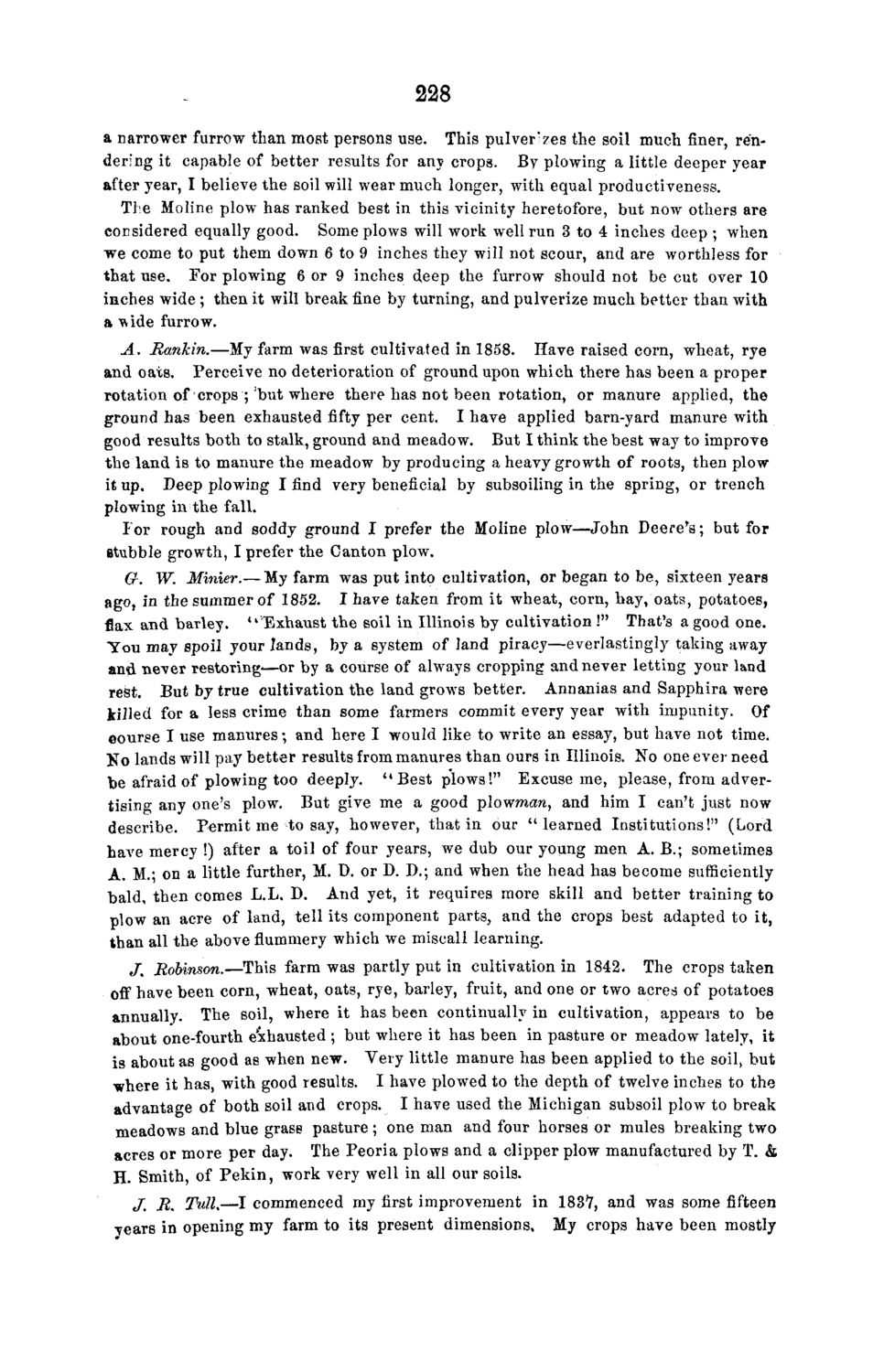| |
| |
Caption: Board of Trustees Minutes - 1868
This is a reduced-resolution page image for fast online browsing.

EXTRACTED TEXT FROM PAGE:
228 a narrower furrow than most persons use. This pulver'zes the soil much finer, rendering it capable of better results for any crops. By plowing a little deeper year after year, I believe the soil will wear much longer, with equal productiveness. The Moline plow has ranked best in this vicinity heretofore, but now others are cocsidered equally good. Some plows will work well run 3 to 4 inches deep ; when we come to put them down 6 to 9 inches they will not scour, and are worthless for that use. For plowing 6 or 9 inches deep the furrow should not be cut over 10 inches wide ; then it will break fine by turning, and pulverize much better than with a wide furrow. A. Rankin.—My farm was first cultivated in 1858. Have raised corn, wheat, rye and oats. Perceive no deterioration of ground upon which there has been a proper rotation of crops ;'but where there has not been rotation, or manure applied, the ground has been exhausted fifty per cent. I have applied barn-yard manure with good results both to stalk, ground and meadow. But I think the best way to improve the land is to manure the meadow by producing a heavy growth of roots, then plow it up. Deep plowing I find very beneficial by subsoiling in the spring, or trench plowing in the fall. For rough and soddy ground I prefer the Moline plow—John DeereTs; but for stubble growth, I prefer the Canton plow. G. W. Minier.—My farm was put into cultivation, or began to be, sixteen years ago, in the summer of 1852. I have taken from it wheat, corn, hay, oats, potatoes, flax and barley. tiVExhaust the soil in Illinois by cultivation !" That's a good one. You may spoil your lands, by a system of land piracy—everlastingly taking away and never restoring—or by a course of always cropping and never letting your land rest. But by true cultivation the land grows better. Annanias and Sapphira were killed for a less crime than some farmers commit every year with impunity. Of eourse I use manures; and here I would like to write an essay, but have not time. No lands will pay better results from manures than ours in Illinois. No one ever need be afraid of plowing too deeply. "Best plows!" Excuse me, please, from advertising any one's plow. But give me a good plowman, and him I can't just now describe. Permit me to say, however, that in our " learned Institutions!" (Lord have mercy !) after a toil of four years, we dub our young men A. B.; sometimes A. M.; on a little further, M. D. or D. D.; and when the head has become sufficiently bald, then comes L.L. D. And yet, it requires more skill and better training to plow an acre of land, tell its component parts, and the crops best adapted to it, than all the above flummery which we miscall learning. J. Robinson.—This farm was partly put in cultivation in 1842. The crops taken off have been corn, wheat, oats, rye, barley, fruit, and one or two acres of potatoes annually. The soil, where it has been continually in cultivation, appears to be about one-fourth exhausted ; but where it has been in pasture or meadow lately, it is about as good as when new. Yery little manure has been applied to the soil, but where it has, with good results. I have plowed to the depth of twelve inches to the advantage of both soil and crops. I have used the Michigan subsoil plow to break meadows and blue grass pasture; one man and four horses or mules breaking two acres or more per day. The Peoria plows and a clipper plow manufactured by T. & H. Smith, of Pekin, work very well in all our soils. J. R. Tull%—I commenced my first improvement in 183T, and was some fifteen vears in opening my farm to its present dimensions. My crops have been mostly
| |